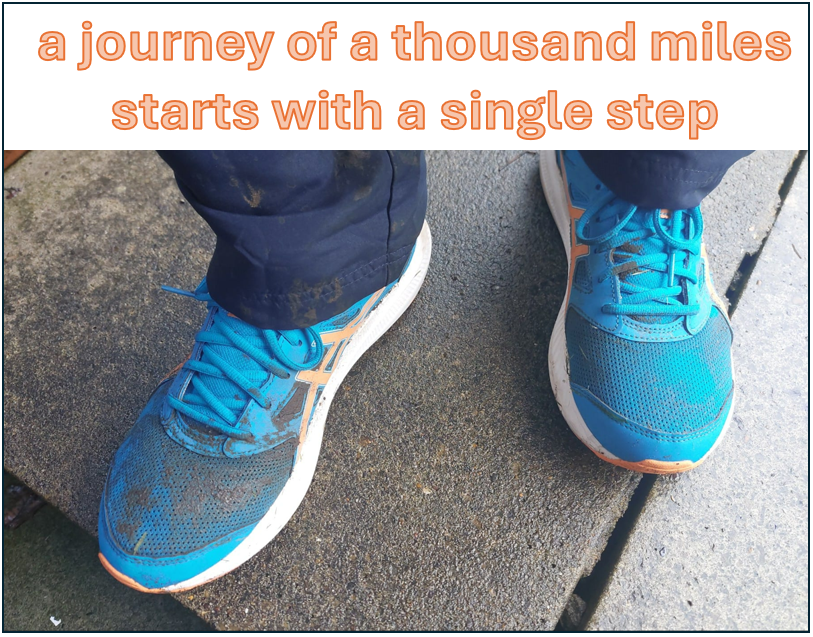Meditative enquiry
To begin, let’s take some time to identify what procrastination is looking like for you around a specific task:
> Think of an example of a task you are procrastinating on.
> Consider how easy or hard it is to focus on that task.
> Do any feelings initially rise in relation to it?
> How does that shift if we imagine doing the task, and then completing it?
> What is our procrastination doing for us, for example is it protecting us?
> Can we thank ourselves for trying our best, and using procrastination?
> Can we tell ourselves that it’s okay – we can ease procrastinating around the task now.
Getting Started
Being prepared can feel important to us. However further preparation can become a symptom of procrastination. Eventually we need to just take that first step and start. The task may not be perfect, or even to the standards you would like or how you might compare yourself to others, but in setting a time to start you will start and in starting we are progressing.
Rather than seeing the task as either complete or incomplete consider it a process and by starting you are starting that process.

Playing with pressure
Take a moment to examine the pressures that are pushing you into doing the thing you are procrastinating over.
The pressures may be external (such as a deadline to hand something in) or internal (like an inner drive to be healthier).
Really examine them to see how true they are. Do you have to do the thing you are putting off? How big are those pressures.
Now also notice the pressures not to do the task. Perhaps how comfortable it may be not to, and the gains you get from not doing the task or the risks from doing it.
In noticing pressures both ways (positive and negative) you can play with them. You can see the extent of the pressure, where it’s coming from, how big it is, and the pressures not to do the task. In examining them, you may well find that you have a new choice to do the task rather than being forced and agency over a task creates motivation in a way that being forced does not because we cannot force people (including ourselves) to do things.
Working from Flow
Responding to pressure to tackle our task can feel like obligation. I feel this particularly with ‘creativity’ such as in content creation. Pressure is a stimulus that is external to us, or our internal reaction to an external condition placed upon us. It’s the opposite from working in a position of creativity or flow. To operate from flow is to rely on our inner motivates, and trust that to guide us. It is responding from us, rather than responding to pressures upon us.
Keeping Going
Deconstructing
Responding to pressure to tackle our task can feel like obligation
Often the things we procrastinate over are large tasks: tasks involving lots of new learnings, programs that need regular investments of time, relationships that are uncomfortable, changing an old vice or habit….
We can procrastinate over the concept of starting that task which can become bigger than the task itself in our minds. When we have started a task, we are procrastinating on it can be helpful to break it down into smaller parts. See yourself as in the process of doing the thing, rather than absolute thinking of it is either done or not done. Then when you are in the process, break it down into a series of smaller tasks you can continue to work on.ion. I feel this particularly with ‘creativity’ such as in content creation. Pressure is a stimulus that is external to us, or our internal reaction to an external condition placed upon us. It’s the opposite from working in a position of creativity or flow. To operate from flow is to rely on our inner motivates, and trust that to guide us. It is responding from us, rather than responding to pressures upon us.
Discipline
We often think to ourselves that we will do the task when we feel like it. Then that feeling rarely comes. Once you’ve started a task, what sustains it is less about how much we want to do it, or feel like doing it, and more about our commitment to do it. Set yourself time to do your task and commit to it, with breaks and self-care time built into that. It won’t always be pleasant, nor will you always feel like it, but that commitment will keep you progressing.
Summary
Your feelings and response to a thing you are procrastinating really matter. Be curious about what is being communicated to you around a task you put-off and weigh up all sides on if this task is worth the investment. If it is, make a start and you’ll likely find you learn the things you are trying to prepare in advanced during the journey. See if you can own the task and make it yours (to operate from a position of flow) – it will feel a lot more natural than forcing yourself for someone else or some pressure. When you start the task, give yourself a schedule of commitment to it, and be disciplined to continue. It’s also okay to not complete it – see yourself as progressing the task rather than it being ‘done’ or ‘not done’, and break it down into smaller chunks. After a period of time on the task (e.g. if it’s a program, perhaps after the first month) review how well the task is meeting your needs and again feel your way into it. Does it still feel a burden or something you want to put off? If so, can something be changed; or is it worth continuing the task?
Simon is a Person-Centred Counsellor in Oxford working remotely and in person. He had been procrastinating around making video content and helping others in this area inspired his flow to write this post







